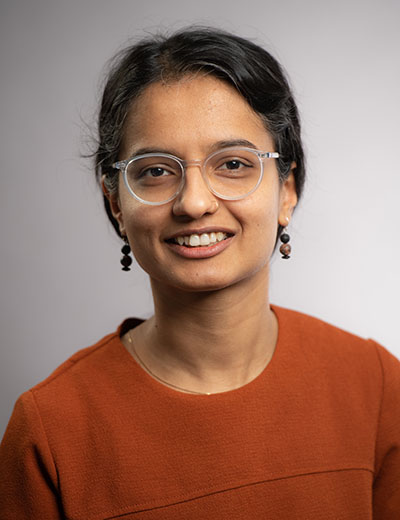Meet Natasha Sekhon of geology, a low-temperature geochemist and paleoclimatologist whose research combines concepts from karst and speleothem sciences to investigate the hydroclimate of terrestrial environments varying on seasonal to millennial time scales.

Assistant Professor of Geology Natasha Sekhon comes to Occidental from Brown University, where she is studying the history of droughts and floods in the Philippines alongside Assistant Professor Daniel Ibarra. A low-temperature geochemist and paleoclimatologist, her research combines concepts from karst and speleothem sciences to investigate the hydroclimate of terrestrial environments varying on seasonal to millennial time scales. Her Ph.D. work explored the utility of stalagmites from near-entrance cave settings in New Mexico as potential recorders of recharge episodes. Sekhon earned her bachelor’s degree with honors in Earth system sciences with a minor in comparative literature at UC Irvine. She earned her master’s and Ph.D. in geological sciences at the Institute for Geophysics and Department of Geological Studies at the University of Texas at Austin, respectively.
What attracted you to Occidental?
The small class setting at Occidental paired against the backdrop of one of the most diverse cities in the United States, Los Angeles, creates a liberal arts environment that I wanted to be a part of. I am excited to be a part of a community where deep disciplinary understanding, embracing student research, with interdisciplinary practice is encouraged. I look forward to establishing an invigorating classroom and becoming a better teacher. I was also attracted by the wide range of scholarships that span many disciplines and the opportunity to collaborate with colleagues allowing faculty to bring the best research and pedagogy skills to the undergraduate setting.
What will you be teaching at Oxy?
I am excited to develop and teach courses around hydrology, geochemistry, paleoclimatology, and speleology. In the Spring Semester, I will be teaching GEO210, Water in a Changing World and GEO105, Earth: Our Environment. The former will explore the physical principles, processes, and dynamics of the water cycle, including how and where water is transformed and transported around the planet and the latter will emphasize on the physical processes that shape the environment on the Earth's surface. In fall 2024, I’ll be teaching a lab-based course on geochemistry and paleoclimatology with hands-on experience at the 300 level. Down the line, I am also interested in co-developing courses around environmental history and time series analysis with faculty across different disciplines.
When did you develop an interest in geochemistry and paleoclimatology?
I remember being curious about the climate and how it shapes cultures around the world since a kid. And since Earth sciences/geology were not subjects that were taught in school, I instead gravitated towards and excelled in geography and chemistry. During my undergraduate years at UC Irvine, I really enjoyed classes in my major, Earth System Sciences, but still felt a pull towards the humanities and ended up a few classes short of a double major in comparative literature. After working in multiple labs at UC Irvine and University of Edinburgh, I found my niche in geochemistry and paleoclimatology, which merges my interests in the sciences and humanities, and I’ve not looked back since then!
What excites you about your research?
By using the geochemical signals of speleothem (calcium carbonate deposits in cave systems), we can reconstruct hydroclimate conditions going back approximately 600,000 years before present. Further, we can assess hydroclimate variability on the annual to multi-decadal temporal scales that cover human-lifespans. I get to solve the climate puzzles stored in the growth layers of speleothems to better understand processes that drive patterns of rain through time. Whether it be in the Guadalupe Mountains of New Mexico or underground river systems in the Philippines, I feel fortunate that I get to engage with local community members and cavers who make doing cave fieldwork possible. So, if I’m not teaching in the classroom, mentoring students with research projects, or in the lab, you’ll find me exploring a cave system. I look forward to getting some cave monitoring sites up and running in southern California.
